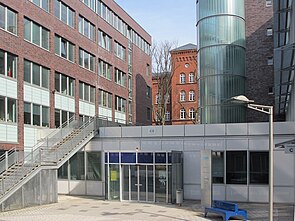Fraunhofer Center for Maritime Logistics and Services
| Fraunhofer Center for Maritime Logistics and Services CML | |
|---|---|
 Fraunhofer Center for Maritime Logistics and Services |
|
| Category: | research Institute |
| Carrier: | Fraunhofer Society |
| Legal form of the carrier: | registered association |
| Seat of the wearer: | Munich |
| Facility location: | Hamburg |
| Type of research: | Applied research |
| Areas of expertise: | Nautical and maritime traffic, ship and fleet management as well as port and terminal development |
| Basic funding: | Federal government (90%), states (10%) |
| Management: | Carlos Jahn |
| Employee: | approx. 40 (2018) |
| Homepage: | CML |
The Fraunhofer Center for Maritime Logistics and Services (CML) is an institution of the Fraunhofer Society . At the Fraunhofer CML and optimize processes and systems scientists develop along the maritime supply chain ( English supply chain). In practice-oriented research projects, private and public clients from the areas of shipping, ports and logistics are supported in initiating and realizing innovations. Depending on the project and customer needs, interdisciplinary teams of engineers, economists, mathematicians, computer scientists and nautical experts work together to create customer-specific solutions for ship and fleet management, nautical science and maritime transport or ports and transport markets. The Fraunhofer CML is part of the Fraunhofer Institute for Material Flow and Logistics in Dortmund.
Research priorities
The Fraunhofer CML is divided into three areas:
Nautical and maritime transport
In the nautical and maritime sector, ship simulators are used as a test environment for innovative nautical technologies and processes. They serve the development and evaluation of technologies for autonomous systems and nautical assistance systems, the nautical safety analysis for plan approval purposes and for the port layout evaluation as well as the nautical risk analysis and maneuver optimization. In addition, the Nautical and Maritime Transport division carries out AIS -based analyzes of maritime traffic and route guidance.
Ship and fleet management
The area of ship and fleet management at the CML develops decision support environments for personnel requirements and deployment. Here, mathematical optimization is used for the solution of dispositive decisions. These are used, for example, in strategic purchasing planning for fleet supply and in the conception and optimization of after-sales services for the maritime supply industry. In addition, the ship and fleet management division is developing new information and communication technologies.
Port and terminal development
The port and terminal development department carries out statistical analyzes of traffic volumes and transport demands. The simulation-based determination of traffic forecasts is used for strategic infrastructure development. Cost-benefit analyzes are used for infrastructure and technology assessments and the Fraunhofer CML has digital planning tables for visually supported port and terminal planning.
Cooperations
The Fraunhofer CML cooperates with national and international scientific facilities and institutions.
Infrastructure
Around 40 people worked at Fraunhofer CML in 2018.
Web links
Individual evidence
- ↑ Prof. Dr.-Ing. Carlos Jahn. Retrieved January 2, 2019 .
- ^ Nautical and maritime transport. Retrieved January 2, 2019 .
- ↑ Ship and fleet management. Retrieved January 2, 2019 .
- ↑ Port and Terminal Development. Retrieved January 2, 2019 .
Coordinates: 53 ° 27 '49.61 " N , 9 ° 58' 11.91" E